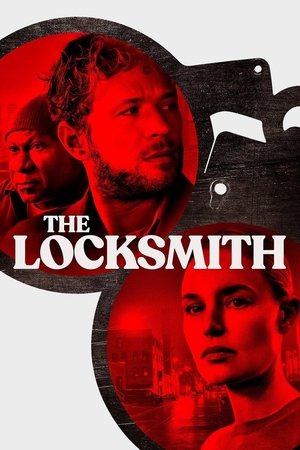Directed by Nicolas Harvard and penned by John Glosser, Ben Kabialis, Chris LaMont, and Joe Russo, with a storyline crafted by Blair Kroeber, “The Locksmith” unfolds as a modest yet proficient neo-noir endeavor. While it may lack a compelling raison d’être, the film subtly weaves sentimental threads of redemption into the rich tapestry of neo-noir traditions.
The narrative kicks off with a fumbled heist, orchestrated by a band of seemingly soulful robbers. Their attempt to secure a nest egg for their families takes a tragic turn when a corrupt cop named Zwick, portrayed with standard-issue corrupt-cop flair by Jeffrey Nordling, intercepts the loot, resulting in the death of one of the robbers, Kevin.
Fast forward ten years, and Miller Graham, the titular locksmith portrayed by a weathered Ryan Phillippe, is released from prison after keeping silent about the unscrupulous Zwick. Now beaten down but determined, Miller forges alliances with old friends and grapples with personal guilt as he navigates a murky world of corruption and crime.
Miller’s former fiancée, Beth (Kate Bosworth), now a detective, becomes entangled in the web of deceit surrounding Zwick, who is on the verge of retirement. The plot thickens as Miller’s daughter, April, has grown up and fallen victim to the clutches of a local sex trafficker. April leverages Miller’s guilt to coerce him into a daring heist to fund her escape from a life of abuse.
What sets “The Locksmith” apart is its departure from traditional neo-noir motifs. While corruption and crime swirl around, Miller’s character stands out for his vulnerability and pushover nature. Unlike the typical femme fatale, seduction is not a weapon in this tale. Miller’s motivations stem not from passion or desire but from a fervent desire to rebuild the family he lost during his incarceration.
As the narrative unfolds, the film introduces a unique twist—Miller imparts his lock-picking skills to his 12-year-old daughter, Lindsay (Madeleine Guilbot). This unexpected angle, infused with elements of charm, hints at the potential usefulness of this skill in a climactic scene. The film, in a departure from convention, suggests that sometimes, a woman might be better suited for the job than a man.
While “The Locksmith” offers a fresh perspective on the neo-noir genre by subverting traditional tropes, it falls short in delivering this narrative shift with the enthusiasm it deserves. Nevertheless, the film remains a compelling exploration of redemption, familial bonds, and the gritty underbelly of a small town consumed by corruption.


